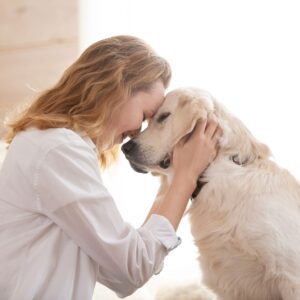Symptoms of allergies in your dog are quite similar to what humans would experience. If your dog is showing longer term signs of sneezing and coughing, wheezing, breathing difficulties, sore eyes, ears, skin or an itchy rash, it may be that your dog is suffering from allergies.
One of the most common allergies in dogs actually comes from their food.
Proteins such as:
- Beef
- Chicken
- Eggs
- Dairy
- Gluten (found in wheat)
can all be a source of allergic reaction, even if your dog has never had problems before. Allergies and intolerances are sneaky and can creep up out of nowhere, so a food trial where you feed your dog a single protein and carbohydrate for 12 weeks at a time is a good place to start your investigations.
Less problematic proteins tend to be the likes of:
- Turkey
- Duck
- Venison
- Rabbit
- Fish
Try moving to specialist complete food providers if your dog is having lots of trouble. Alternatively, your vet can help with prescription hypoallergenic food if you prefer a kibble / canned diet for your dog. Vet prescribed dog food has all the allergens removed from the proteins so you should be in safe hands with these, but they can be on the pricey side.
Dogs can also be triggered by environmental allergens such as grasses, pollen, household chemicals, dust mites and pests, as well as some medicines. To combat these allergic reactions, choose natural and dog-friendly cleaning products in your home, avoiding scent diffusers and plug-in air fresheners. Keep your house clean, hoovered, and pest free, and be sure to de-flea your dog regularly. In high hay fever season, you can give your dog some types of antihistamines, but you must consult with your vet before giving your dog any type of medication.
As always, your trusty vet will be able to give you expert guidance on how to diagnose and treat allergies, as well as eliminating any other causes of the above symptoms which may be confused with another non-related condition. You know the rules here at Wooflinks, your vet is always the best bet for your pet!









Add a comment